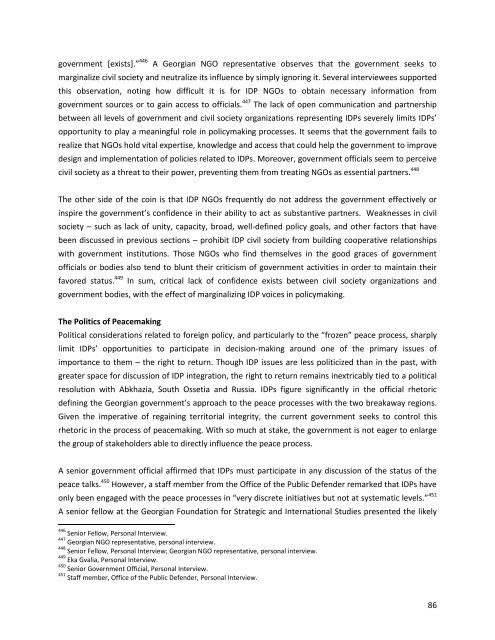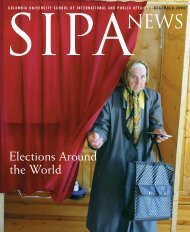especially highly-<strong>in</strong>fluential broadcast media. 443 <strong>Georgia</strong>n civil society actors <strong>in</strong> general share thisproblem. While events <strong>in</strong> Abkhazia are present <strong>in</strong> the daily news cycle, stories about IDPs usually arenot. This enforces the public perception that the conflict is primarily about territory, rather than people.These factors comb<strong>in</strong>e to marg<strong>in</strong>alize IDPs <strong>in</strong> the m<strong>in</strong>ds of policymakers, add<strong>in</strong>g little <strong>in</strong>centive to pushto open more pathways for IDPs to be <strong>in</strong>cluded <strong>in</strong> policymak<strong>in</strong>g. This po<strong>in</strong>ts to the need for IDPs to raiseawareness about their situation <strong>and</strong> needs <strong>in</strong> a way that demonstrates solidarity <strong>and</strong> <strong>in</strong>tegration withthe rest of the <strong>Georgia</strong>n population. IDPs must draw attention to their cause so that the public sees their<strong>in</strong>terest <strong>in</strong> improv<strong>in</strong>g life <strong>in</strong> <strong>Georgia</strong> for all, rather than as an <strong>in</strong>dolent group seek<strong>in</strong>g h<strong>and</strong>outs.Information <strong>and</strong> Underst<strong>and</strong><strong>in</strong>g Regard<strong>in</strong>g Political ToolsAs noted <strong>in</strong> the previous sections, many IDPs seem not to have acquired the habits of politicalparticipation <strong>in</strong> part due to the legacy of the Soviet system <strong>and</strong> previous vot<strong>in</strong>g restrictions. 444 Inaddition to creat<strong>in</strong>g psychological barriers to participation, this history has practical impacted IDPs’underst<strong>and</strong><strong>in</strong>g of how to participate <strong>in</strong> civic life. 445 It seems that new projects based around socialmobilization theory may successfully foster leadership skills among IDPs, <strong>and</strong> <strong>in</strong> particular women IDPs,that will allow them to become leaders <strong>in</strong> their communities. Eventually, this skill set <strong>and</strong> experiencemay translate <strong>in</strong>to leadership skills that could translate <strong>in</strong>to the skills <strong>and</strong> impetus to become moreregularly politically active.Because few displaced persons hold prom<strong>in</strong>ent public positions, many IDPs lack role models that canprovide them with guidance <strong>in</strong> becom<strong>in</strong>g active <strong>and</strong> organized, as well as confidence to pursue theirrights <strong>in</strong> spite of the limit<strong>in</strong>g factors that many IDPs face. This is particularly true for women IDPs, as<strong>Georgia</strong>n women <strong>in</strong> general have few role models serv<strong>in</strong>g as examples of successful <strong>and</strong> admirablewomen <strong>in</strong> politics. When asked, most of our <strong>Georgia</strong>n women <strong>in</strong>terviewees, IDP or not, had difficultyidentify<strong>in</strong>g female role models <strong>in</strong> politics; several named current Deputy Chairperson of the Parliament<strong>and</strong> Chair of the parliamentary Gender Advisory Council Rusudan Kervarishvili. Moreover, IDPs haveaccess to limited networks to help them learn to be politically successful.Relationship Between Civil Society <strong>and</strong> GovernmentDis<strong>in</strong>terest, distrust, <strong>and</strong> at worst, antagonism seem to characterize civil society’s <strong>and</strong> government’srelationship. As a senior fellow at the <strong>Georgia</strong>n Foundation for Strategic <strong>and</strong> International Studiesexpla<strong>in</strong>s, <strong>Georgia</strong> is still “very far from the ideal situation where cooperation between civil society <strong>and</strong>443 In its 2011 “Freedom <strong>in</strong> the World” report, Freedom House noted that media freedom rema<strong>in</strong>s a challenge <strong>in</strong> <strong>Georgia</strong>.Freedom House. “<strong>Georgia</strong>.” Freedom <strong>in</strong> the World 2011. Freedom House, 2011. Web. Senior fellow, Personal Interview; T<strong>in</strong>aGewis, Personal Interview.444 Logically, this legacy would affect old-wave IDPs more than new-wave due to the tim<strong>in</strong>g of displacement. However, detailedanalysis support<strong>in</strong>g this hypothesis is not available.445 Eka Gvalia, Personal Interview.85
government [exists].” 446 A <strong>Georgia</strong>n NGO representative observes that the government seeks tomarg<strong>in</strong>alize civil society <strong>and</strong> neutralize its <strong>in</strong>fluence by simply ignor<strong>in</strong>g it. Several <strong>in</strong>terviewees supportedthis observation, not<strong>in</strong>g how difficult it is for IDP NGOs to obta<strong>in</strong> necessary <strong>in</strong>formation fromgovernment sources or to ga<strong>in</strong> access to officials. 447 The lack of open communication <strong>and</strong> partnershipbetween all levels of government <strong>and</strong> civil society organizations represent<strong>in</strong>g IDPs severely limits IDPs’opportunity to play a mean<strong>in</strong>gful role <strong>in</strong> policymak<strong>in</strong>g processes. It seems that the government fails torealize that NGOs hold vital expertise, knowledge <strong>and</strong> access that could help the government to improvedesign <strong>and</strong> implementation of policies related to IDPs. Moreover, government officials seem to perceivecivil society as a threat to their power, prevent<strong>in</strong>g them from treat<strong>in</strong>g NGOs as essential partners. 448The other side of the co<strong>in</strong> is that IDP NGOs frequently do not address the government effectively or<strong>in</strong>spire the government’s confidence <strong>in</strong> their ability to act as substantive partners. Weaknesses <strong>in</strong> civilsociety – such as lack of unity, capacity, broad, well-def<strong>in</strong>ed policy goals, <strong>and</strong> other factors that havebeen discussed <strong>in</strong> previous sections – prohibit IDP civil society from build<strong>in</strong>g cooperative relationshipswith government <strong>in</strong>stitutions. Those NGOs who f<strong>in</strong>d themselves <strong>in</strong> the good graces of governmentofficials or bodies also tend to blunt their criticism of government activities <strong>in</strong> order to ma<strong>in</strong>ta<strong>in</strong> theirfavored status. 449 In sum, critical lack of confidence exists between civil society organizations <strong>and</strong>government bodies, with the effect of marg<strong>in</strong>aliz<strong>in</strong>g IDP voices <strong>in</strong> policymak<strong>in</strong>g.The Politics of Peacemak<strong>in</strong>gPolitical considerations related to foreign policy, <strong>and</strong> particularly to the “frozen” peace process, sharplylimit IDPs’ opportunities to participate <strong>in</strong> decision-mak<strong>in</strong>g around one of the primary issues ofimportance to them – the right to return. Though IDP issues are less politicized than <strong>in</strong> the past, withgreater space for discussion of IDP <strong>in</strong>tegration, the right to return rema<strong>in</strong>s <strong>in</strong>extricably tied to a politicalresolution with Abkhazia, South Ossetia <strong>and</strong> Russia. IDPs figure significantly <strong>in</strong> the official rhetoricdef<strong>in</strong><strong>in</strong>g the <strong>Georgia</strong>n government’s approach to the peace processes with the two breakaway regions.Given the imperative of rega<strong>in</strong><strong>in</strong>g territorial <strong>in</strong>tegrity, the current government seeks to control thisrhetoric <strong>in</strong> the process of peacemak<strong>in</strong>g. With so much at stake, the government is not eager to enlargethe group of stakeholders able to directly <strong>in</strong>fluence the peace process.A senior government official affirmed that IDPs must participate <strong>in</strong> any discussion of the status of thepeace talks. 450 However, a staff member from the Office of the Public Defender remarked that IDPs haveonly been engaged with the peace processes <strong>in</strong> “very discrete <strong>in</strong>itiatives but not at systematic levels.” 451A senior fellow at the <strong>Georgia</strong>n Foundation for Strategic <strong>and</strong> International Studies presented the likely446 Senior Fellow, Personal Interview.447 <strong>Georgia</strong>n NGO representative, personal <strong>in</strong>terview.448 Senior Fellow, Personal Interview; <strong>Georgia</strong>n NGO representative, personal <strong>in</strong>terview.449 Eka Gvalia, Personal Interview.450 Senior Government Official, Personal Interview.451 Staff member, Office of the Public Defender, Personal Interview.86
- Page 2 and 3:
Promoting IDPs’ and Women’s Voi
- Page 4 and 5:
CONTENTSAcronyms and Abbreviations
- Page 6 and 7:
EXECUTIVE SUMMARYInternally displac
- Page 8 and 9:
THE WOMEN’S POLITICAL RESOURCE CE
- Page 10 and 11:
fair reporting on politically sensi
- Page 12 and 13:
people-to-people diplomacy efforts
- Page 14 and 15:
and the Guiding Principles, in Febr
- Page 16 and 17:
an effort to address these stereoty
- Page 18 and 19:
The identities, perceptions, and re
- Page 20 and 21:
even IDPs themselves. The HRBA seek
- Page 22 and 23:
Karaleti settlement, and Potskho-Et
- Page 24 and 25:
displacement differently, with men
- Page 26 and 27:
on an equal footing with men in for
- Page 28 and 29:
The Ministry for Internally Displac
- Page 30 and 31:
Defender’s Office) and leave no r
- Page 32 and 33:
prominent national level IDP NGO wo
- Page 34 and 35:
in the past but none have yet to be
- Page 36 and 37: Grassroots Peacebuilding EffortsCiv
- Page 38 and 39: esettlement and local integration h
- Page 40 and 41: ability to contribute to the new Ac
- Page 42 and 43: Women convened a working group to a
- Page 44 and 45: were involved, in addition to “wo
- Page 46 and 47: towards addressing this population
- Page 48 and 49: waves. 224 A Conciliation Resources
- Page 50 and 51: governing shelter requirements. 238
- Page 52 and 53: esults of eviction on those who did
- Page 54 and 55: FINDINGSSIPA team member Drilon Gas
- Page 56 and 57: unique opportunities exist for them
- Page 58 and 59: an important opportunity for women
- Page 60 and 61: early morning…when I was going to
- Page 62 and 63: our office to investigate these iss
- Page 64 and 65: on this? It’s impossible.” 322
- Page 66 and 67: high levels of unemployment and pov
- Page 68 and 69: groups do not differentiate between
- Page 70 and 71: funding and influence to implement
- Page 72 and 73: een in operation for two years or l
- Page 74 and 75: organization, and highlighted that
- Page 76 and 77: The Education System’s Influence
- Page 78 and 79: system has an important role to pla
- Page 80 and 81: Political FactorsMany elements of t
- Page 82 and 83: international organizations working
- Page 84 and 85: uling party. 433 There were some si
- Page 88 and 89: ationale behind the government’s
- Page 90 and 91: international working for a major d
- Page 92 and 93: Also, according to a World Bank rep
- Page 94 and 95: willing to challenge authorities th
- Page 96 and 97: The lack of narrative connecting po
- Page 98 and 99: RECOMMENDATIONS FOR THE GEORGIAN GO
- Page 100 and 101: the government also needs to commit
- Page 102 and 103: ‣ Continue to support and expand
- Page 104 and 105: ‣ Address male IDP needs (Immedia
- Page 106 and 107: The campaign should have a face, su
- Page 108 and 109: APPENDIX BList of IntervieweesLocal
- Page 110 and 111: Kristy KellyLincoln MitchellLawrenc
- Page 112 and 113: Article 10 - Non-discrimination in
- Page 114 and 115: Principle 18.1 - Adequate standard
- Page 116 and 117: Esaiashvili, Mariam (Official, Mini
- Page 118 and 119: Lanskoy, Miriam and Giorgi Areshidz
- Page 120: Transparency International Georgia.

















